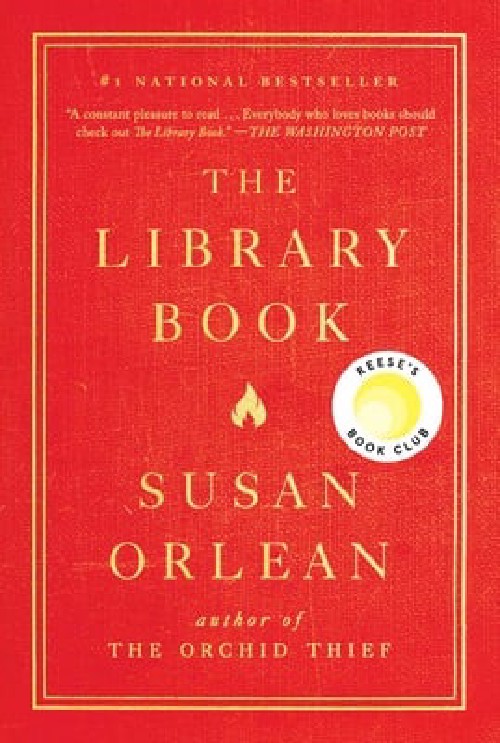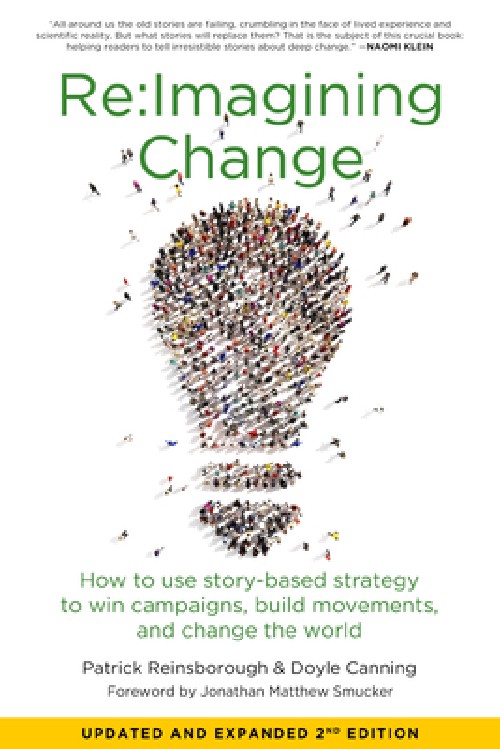This was the first issue of my newsletter Bookworm, sent on January 31, 2022. Subscribe here..
When white people stormed onto Turtle Island, we brought with us a set of narratives that let us see what we wanted to see and justify doing whatever we wanted to do. The land my ancestors pillaged and claimed was not “virgin” or “pristine” or a “promised land,” it was a vast landscape of cultivation and symbiosis. The people who had inhabited these lands for millennia were not “savages” or “uncivilized” but just other people; people who believed that all the beings on Turtle Island were in community and it was possible for humanity to thrive alongside the flourishing of the other beings. White people had no such beliefs and we also had stories that let us justify genocide, slavery, the consumption of Turtle Island’s many inhabitants as “resources” to build our wealth and power.
Much of my reading in the latter half of 2021 centered around the ideas in that previous paragraph, ideas that I keep mulling and figuring out how to make sense of. One (among many) terrible aspects of being alive in 2022 with a fairly strong grasp of the severity of climate change is a haunting feeling that you are a passenger on a train racing off a cliff. Or maybe a ship, slowly filling with water? Or perhaps the proverbial frog in the slowly heating pot of water. What a terrible curse for so many of us to understand that disaster is imminent, and yet the systems and institutions around us mostly continue to act as if things are fine. What is to be done?
One of the problems I enjoy thinking about with other people (via books, podcasts, conversations, and any other medium) is what possibilities do we have for averting the worst-case scenarios of climate change. If there is a chance of catastrophic success, where does it lay? I’ve enjoyed learning more about the field of Systems Thinking in the past few years because it has taught me to try and embrace complex understandings of problems—what is climate change if not one of the most complex problems humans face? Simple explanations of complex problems are harmful because they delude us into thinking there’s One Simple Thing that can address the issue. Trusting simple explanations will cause us to downplay all the many things working to maintain the status quo and resist our change. If a project is taking too long, we just need to put more people on it. If crime is rising, we just need more cops. If Earth’s future is looking sketchy, we should invest in going to another planet. This form of problem solving rests on our innate love of a good story: problems are villains and villains get defeated by heroes. Good vs evil, right vs wrong, neat and tidy and they live happily ever after.
Complex explanations of problems invite us to ignore convenient narratives and try to understand what the actual causes may be, which might help us identify better solutions. Projects moving too slow may move even slower with more people if the issue is poor communication and lack of shared context amongst everyone doing the work. There is decades of evidence that crime is usually a result of other issues; hunger, instability, lack of options when emergencies arise, which are not addressed with police budgets. Cops tend to address crime after the fact, and the more cops we have the more time they have to antagonize marginalized people and make their lives worse. Our problems rarely need masculinized saviors with guns, but when we address them at the roots, we build a community that creates less harm. And regarding the future of this planet, well, perhaps before we hang our hopes on billionaires terraforming another planet, we should try and understand rich people’s culpability in the shit job we’ve done terraforming this planet.
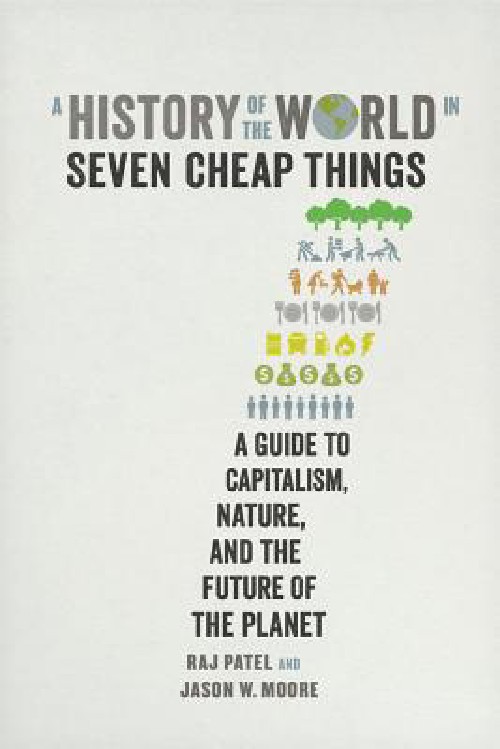
A History of the World in 7 Cheap Thins
Copyright 2018, University of California Press
Cultural Analysis
In Raj Patel and Jason W. Moore’s fascinating book The History of the World in 7 Cheap Things, their thesis is that we’ve done a shit job of terraforming this planet because of capitalism, and they put forth an analysis of the seven overlapping subsystems of capitalism that we have developed to help us get to now. The title sets you up to expect objects like toothbrushes and syringes, but the authors are more interested in systems than objects. Their argument is that capitalism is a system perpetuated by the cheapening of things such as nature, labor, care-work and even human lives. By examining the ways these conceptual groupings of very real components of our world are devalued through religious narratives, state policies, and actual histories, they help us map out the way we have come to build a world that assumes the limits of our planet don’t matter, even though the future of humanity is very much dependent on living within those limits. This book is helpful for thinking more clearly about components of capitalism that are often treated as symptoms, but which the authors argue are necessary ingredients. This book was helpful for me in tying together disparate threads like the long shadow of colonization; the eternal under-valuing of nursing and teaching; with the ways that so many people believe the only good ecosystem is one that is stripped of anything resembling a commodity—no matter the externalities* created.
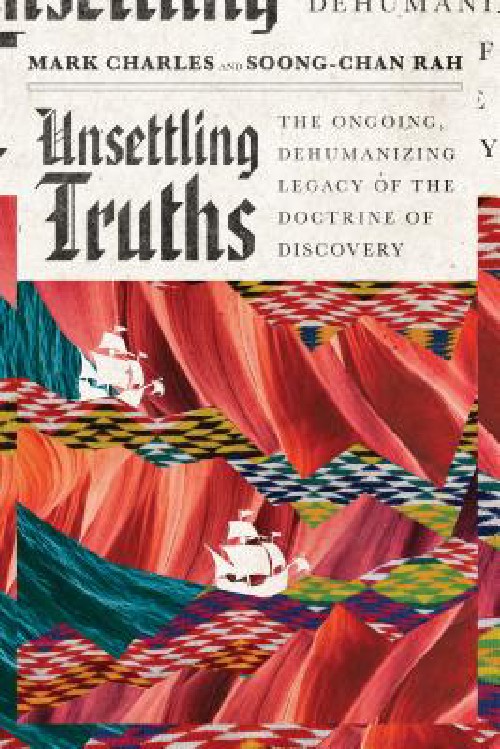
Unsettling Truths
Copyright 2019, IVP Books
Indigenous Issues, Cultural Analysis
Soon after I read 7 Cheap Things, I picked up Mark Charles’ and Soong-Chan Rah’s Unsettling Truths: The Ongoing, Dehumanizing Legacy of the Doctrine of Discovery, and my thinking was challenged again. In this book, Charles (who is indigenous American) and Rah (who is Korean-American) argue that the Doctrine of Discovery (the religious belief that Christians have a right to seize all lands not inhabited by Christians, with roots in papal decrees from the 1455) is a heretical theology that still underpins the United States operating narratives, beliefs, and legal principles. Indeed, they trace its history from pre-colonial era in Europe all the way to Supreme Court citations by Ruth Bader Ginsburg just over a decade ago. This doctrine created a distinction between Christian (superior) and non-Christian (inferior) peoples, and justified campaigns of colonization as a way of “saving” the inferior people. The authors both make the case for this entire doctrine being blasphemous, as well as trace US history through its lens. Their project is nothing less than trying to destroy the foundations of the US’s founding myths. But it’s hard to dispute their main argument; Charles and Rah show that only through the logic of this doctrine could a nation be built upon a multi-century campaign of terror and genocide against indigenous people, and define all Black inhabitants of the land as inferior humans who could not be equal to white people, even as the white people of the nation believed themselves to be building a Christian nation.
Between 7 Cheap Things, with its attempt to understand capitalism as a dynamic historic system, and Unsettling Truths’ persuasive argument about the terrible beliefs that continue to fuel the growth of this system, one begins to despair of possibilities. Humans with power and capital have spent the past 400 years or so building up a robust system to ensure that we continue to undervalue things like nature and care work, while building a legal regime that takes the superiority of some humans over others as a “god-given” fact, with hundreds of years of legal precedent to cling to. It does not seem like the status quo offers us much possibility of the radical change that we need.
The two books I’m about to talk about have offered me new ways of thinking about the world, but I’m pausing to name a thing I’m wary of. Both books are about indigenous histories and ways of being, written by indigenous authors. They suggest possibilities I cannot find inside the “imperialist white supremacist heteropatriarchy” (as bell hooks named it) that controls the power and resources of most of the world currently. I interject here to recognize that seeing how these books suggest better futures is not the same as seeing how those futures come to be. One root of colonialism is the assumption that white people have the right to take anything they want, including ideas, to use for their own gain. But there can be no better futures unless we reconcile with the past, and our past (and present) is premised on horrific injustice towards indigenous peoples. So here is where I state explicitly I can imagine futures built upon the things discussed in these books, but I don’t believe the current power structures can get us there, because indigenous beliefs and ways of being are not just hanging around waiting for white people to steal them and implement them at scale. Decolonization is not a metaphor. Any attempt to implement these ways of living that do not involve destroying the systems built upon injustice; working to restore indigenous people’s relationships to their lands; and seeking to address the harms perpetuated against those people is another form of colonialism. The futures I am interested in do not require us to replicate the injustices of the past.
Biology has a concept that is increasingly becoming important to my politics: symbiosis. This is when two or more organisms live together in a way that advantages each; they collaborate to build a better life for themselves than either could achieve independently. Lichens are a common example; lichens are actually the result of a fungus and an alga that live in symbiosis; their capacities together allow them to thrive in places that would kill each of them if left on their own. We are taught evolution as competition; “survival of the fittest” means the weak and puny will die. However, symbiosis is possibly just as common as competition in nature, suggesting that collaboration and mutual thriving could be just as important to survival. The stories of competition and evolution we use to justify economic and corporate policies may actually be terribly incomplete. Looking outside of western imperial history makes that easier to see.
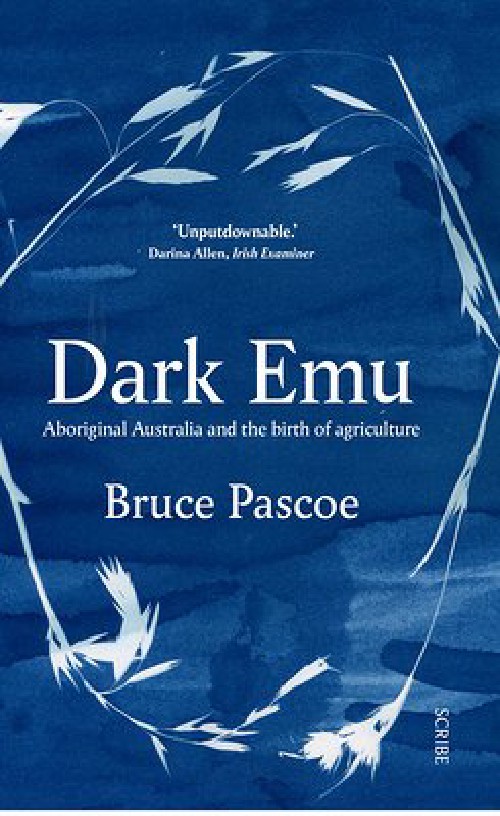
Dark Emu
Copyright 2018, Scribe US
Indigenous Issues, Cultural Analysis
In Dark Emu, Bruce Pascoe delves into the journals of early colonial explorers in Australia to question the stories that white Australians believe about aboriginal people. Reading the book left me quite infuriated and angry. His argument is pretty simple: the racism of the first white explorers—plus their need to justify their colonial desires—meant that they refused to see what they were looking at across the land, and instead recorded things that fit their preexisting racist narratives. Despite this, what Pascoe reveals is that instead of encountering a vast, empty Outback with occasional nomadic hunter-gatherer tribes, the pre-colonized Australia was a land of abundant cultivated agriculture that the Aboriginal people had spent literal millennia tending. This is revealed in the scale of earthworks the colonizers document, the rapid retreat to wilderness the land would undergo when colonizers removed aboriginal people to claim their territory, and of course is further confirmed in the histories of the aboriginal people and the archeological findings when researchers can be bothered to look. Pascoe’s book evocatively suggests that if humans are willing to work with ecosystems and understand natural abundance they can flourish, and as he explores, it can happen with relatively little labor from any one person with no people needing to dominate over others. The book suggests that there are so many other ways of inhabiting our world, but white people fueled by dreams of wealth and god-glorying dominance have spent centuries intentionally (and also accidentally) erasing the evidence of those other ways.
Our History is the Future by Nick Estes is a very different book, looking at the history of the lands surrounding Standing Rock, and examining how the US State and white people have consistently acted genocidally and malevolently to take a thriving, open ecosystem that sustained many different life-forms, then terraformed it into a weak, unhealthy system that mostly props up our vast energy needs at the expense of any being that seeks to call the place home. This book is notable for two reasons; first because so few histories of indigenous people are written by indigenous historians and take seriously the forms of history that oral cultures use. So much of the framing of white people history books (even when focused on indigenous people and telling “their side” of the story) uses language and framing that prioritizes written histories and suggests that records that come from non-written forms are untrustworthy. Because Estes takes seriously the many records he has, there is no caveating or undermining of sources outside institutionally respected forms. Second, Estes writes a history that accounts for what has been lost. The book captures a grief for the land and the beings who called it home (human and other), and accurately places the responsibility of the loss on US shoulders. Because of this, the book is not simply a history of how we came to need water protectors at Standing Rock to protest pipelines. It is instead a much richer history of what existed when indigenous people were the main humans on the land and how white people have consistently seen only short-term value in various aspects of the land and made decisions to harm/limit/prevent indigenous stewardship to capture that value. It’s a searing examination of two incompatible ways of inhabiting the world; one that seeks symbiosis, one that seeks domination. Estes argues that the indigenous way (their history) is the only path forward to the future.
I had hoped to expand this essay to include two more books, one about mycorrhizal networks in forests, and another a scifi book considering a galaxy where humans are minor participants in a galactic network, basically only surviving because the galactic order has had mercy after humans were unable to find a way to live within the limits of our planet. But this post feels long enough as is, so I’ll save that for next month.
If you want to change a thing—whether something in yourself or the way the world works—it helps to have a sense of why that thing is the way it is. At least, that seems right to me. That’s how I initially started this post, but it feels better to end there. My hope this year is to write a monthly newsletter to process the ways I’m making sense of the world and documenting the questions I’m finding. Thanks for reading, I hope that we all get to inhabit better futures.
* Externalities is the term economists use to mean “things that happen outside of the cost calculations.” Most plastics do not biodegrade and thus will sit around on the earth for millions of years, but since the “cost” of plastic is just what is involved in manufacturing, marketing and sales, the environmental impact is an “externality.”
